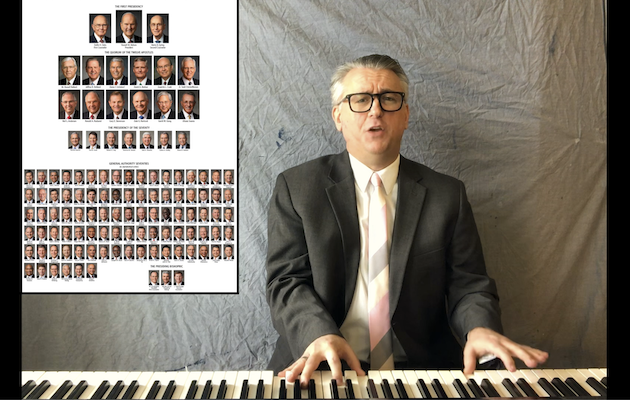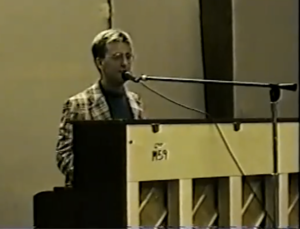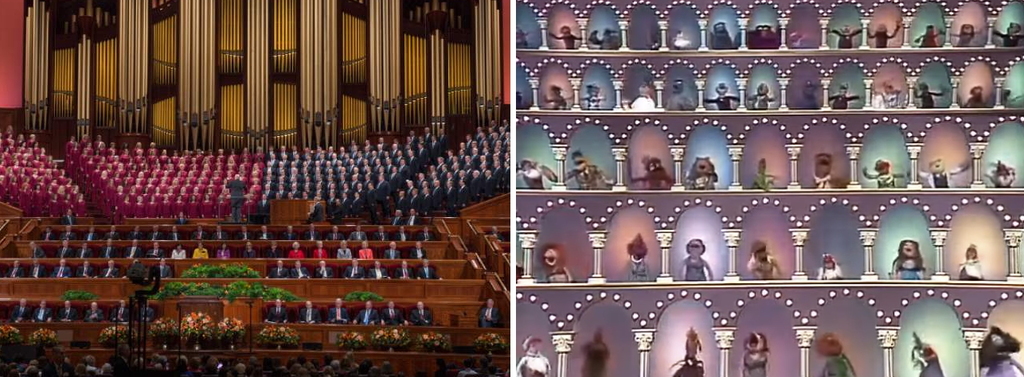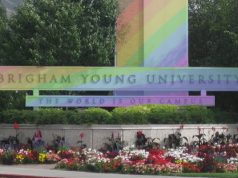
First things first: Here is the latest version of “The General Authorities Song.”
And now, the story.
Late in the fall of 1995, I was back at BYU after my missionary service (I’d been in Philadelphia) and was trying to think of funny religious-themed things I could write for the Garrens Comedy Troupe. Mormon, Utah, and BYU culture (which are deeply intertwined) had always been targets for us — we were all Latter-day Saints who performed at BYU in Provo for a mostly LDS audience — but it was especially on my mind now because I had just spent two years thinking of little else.
First I tinkered with a song about LDS scholar Hugh Nibley, knowing it was too niche but amusing myself with rhymes like “his intelligence is just colossal / I don’t know why he’s not an apostle.” This led me to consider a song about the Quorum of the Twelve Apostles that leads the LDS Church. “Neal A. Maxwell / knows his facts well” instantly sprang to mind.
Then I thought about the several songs that LDS children sing in Primary that are meant as mnemonic devices: the books of the New Testament in order, the latter-day prophets in order, and so forth, set to music. A song naming the current First Presidency and Quorum of the Twelve (a total of 15 men) would be useful — useful, but not funny.
But what if the song included ALL of what we call the “general authorities” — those 15 men, plus the members of (at the time) the First and Second Quorums of the Seventy and the Presiding Bishopric — a total of about 90 names?
Even without any jokes, it would be funny if I found the names that rhymed with each other and sang them quickly under the absurd premise that this song should be memorized and sung by children. (To be clear: Nobody would actually expect even the most devout Latter-day Saint to know all these names.) I was intimately familiar with Professor Tom Lehrer’s “The Elements,” not to mention the Animaniacs’ various list songs, so the concept wasn’t daunting.
I came up with a very basic but jaunty piano riff that I could easily repeat and change keys with, got to work with a list of the general authorities’ names, and debuted “The General Authorities Song” at the Feb. 6, 1996, Garrens Comedy Troupe performance.* For maximum showmanship, I actually memorized it and used no cheat sheets. It got a standing ovation — as far as I recall, the only time that ever happened in the middle of a show. (Of course, maybe I wouldn’t remember it if it happened to someone else.)

It became my signature song, I suppose. I updated it as necessary; those top 15 leaders are lifetime positions, but the rest may serve for as little as a few years. I would listen very carefully during those announcements at the church’s semiannual general conference. When someone whose name provided a good rhyme was released (or died), I was crushed. Like this one:
“Then there’s Dennis B. Neuenschwander
Whatever your name is, his is longer”
Neuenschwander! That was a load-bearing rhyme! The song almost collapsed without it.
The song got longer over the years as the size of the church’s leadership grew. The original version had 90 names in 15 stanzas. Today there are 117 names, requiring 19 stanzas. The office of a “Seventy,” once fairly literal (there were no more than three score and ten of them), became figurative; at the moment, there are 98 Seventies.
Sometime in the early 2000s I made the left-hand part more interesting, but otherwise the music has stayed essentially the same. Sometimes at the end I added the first nine notes of the LDS hymn “We Thank Thee, O God, for a Prophet,” but I think I’ve decided I don’t like that anymore.
Two other changes for other reasons: I used to say “nosotros amigo Francisco Viñas” until someone pointed out that I was an idiot and it should be “nuestro amigo Francisco Viñas.” (And then I think I said “nuestros” for a while.) I took three years of Spanish in high school and three semesters in college. You see how much good it did me.
I also had this couplet:
“Kazuhiko Yamashita
L. Tom Perry’s pleased to meet ya”
Until I learned that his name isn’t pronounced “Ya-ma-SHI-ta,” it’s more like “Ya-MOSH-‘ta” — closer in rhyme to “Costa” than “meet ya.” Management regrets the error.
I originally omitted middle (or first) initials for convenience’ sake, but it felt weird, especially for the very top leaders of the church who ALWAYS used those initials. He was Gordon B. Hinckley, not just “Gordon Hinckley.” As someone who is explicitly Eric D. Snider and not just “Eric Snider,” I should have been more attuned to this than I was — honestly, omitting the initials is what made it seem potentially disrespectful. If someone had said, “It’s disrespectful to just call him ‘Gordon Hinckley,’ I wouldn’t have been able to argue. Anyway, somewhere along the line I started putting the initials back in wherever it was humanly possible.
I can’t abide a W. though. Ain’t nobody got time for a three-syllable initial. Sorry, Elder Gong and Bishop Waddell.
The song includes only general authorities. The presidencies of the Sunday School, young women, young men, and Relief Society (the women’s organization) are general officers. And area authorities only have authority in their areas, not generally. (Area authorities were initially introduced as third, fourth, and fifth Quorums of the Seventy, with several dozen new names. My stomach fell as I considered how unwieldy the song would be. I was relieved when President Hinckley made explicitly clear that these were NOT “general authorities.” It was almost like he was speaking directly to me.)
• • •
If you’ve been to BYU or are familiar with BYU attitudes (perhaps because of how much I’ve made fun of them), you might be wondering: Did anyone find this song offensive? These men are respected and revered, right? Were people offended by hearing their names sung so casually in a comedy environment?
The answer is yes, of course — everything at BYU is offensive to someone — but not many. Or at least not many that I heard about. I always introduced it with the premise of it being a mnemonic device like those children’s songs, to make it clear that I was approaching it as a friend, not an antagonizer. I also avoided saying anything about any of the men in the song beyond their names and some basically applicable things like “has the Spirit” or “we should listen to what they tell us.”
The one real exception to this was “Boyd K. Packer don’t tell no jokes,” which was largely true and which I think Elder Packer would have been a good sport about. (He had a sense of humor; he just didn’t use it often in his talks.)
Which leads us to another question: Did anyone mentioned in the song ever hear the song? Many general authorities had children or grandchildren at BYU, so we knew some GA offspring must have heard it, but it wasn’t until 2021 that I got confirmation of a direct listen: The son of someone mentioned in the very first version of the song, who is still in the current version (that should narrow it down), told me on Twitter that he and his sister had heard it at BYU and later played a recording for their parents, who thought it was funny. Whew.**
• • •
The Garrens and I always joked about “The General Authorities Song” being the opening theme music for the church’s semiannual general conferences, ideally with the general authorities entering and taking their seats as their names are called. Visually, it would look something like the opening of “The Muppet Show.” This sort of talk probably is disrespectful, so forget I mentioned it.
The Garrens Comedy Troupe ended in 2001. I did a handful of solo shows, just me and the piano, between 2003 and 2006. After that, with no place to perform it, I had no reason to keep updating the song. Nonetheless, I persisted, primarily for the benefit of family and friends who requested it (notably the Ken & Katie Craig family, my biggest cheerleaders not related to me). Several of those versions were never performed more “publicly” than somebody’s house.
• • •
This is the 20th version of the song. Here are the iterations that have been preserved for posterity (I seem to have lost two of the three versions between 6 and 10). Dates are the first public performance or the date as of which the song was accurate.
Original version (2/6/1996): Text
2nd version (10/4/1996, the night before general conference): Text
3rd version (10/11/1996, incorporating the changes made at general conference six days earlier): Text
4th version (7/11/1997): Text
5th version (10/3/1998): Text || Audio
6th version (10/1999, I think): Audio
? version (9/2003): Audio
10th version (11/2005): Audio || Text
11th version (11/2007): Text
12th version (5/2009): Text
13th version (11/2010): Audio || Text
14th version (11/2012): Text
15th version (5/2014): Text
16th version (5/2016): Video || Text
17th version (11/2017): Text
18th version (5/2018): Text
19th version (12/2019): Video || Text
20th version (2/2021): Video || Text
__________________________________
*In this show I also starred in a sketch that was one of the worst things I ever wrote or performed. It was a rubbery, high-energy Jim Carrey type of character that I just wasn’t good at.
**A journal entry, Feb. 22, 1996: “Jeffrey R. Holland’s son, Dave, is in my writing class. So yesterday, I gave him a tape of ‘The General Authorities Song’ to give to his dad. I really hope he responds.” I have no memory of this at all — if you’d asked me if I’d ever met any of Jeffrey R. Holland’s children I’d have said no — so I assume I didn’t hear back.



